- Home
- George R. R. Martin
Hunter's Run Page 15
Hunter's Run Read online
Page 15
The alien had stopped. Its hot orange eye looked dull. The red, swollen eye had darkened like congealing blood. Its skin, neither ashen nor displaying the slick dancing patterns it had first had, was the matte texture of drawing paper and the color of charcoal.
“We must pause,” Maneck said. “We must regain our strength.”
Ramón felt a stab of annoyance. There wasn’t time for this. But it was also a sign that Maneck was weak. The devil wasn’t shrugging off the injuries from the other Ramón’s trap. That, at least, was a good sign. Maneck might still be armed, but it wasn’t invulnerable. If the other Ramón could only find a way to break the alien’s hold on him, then together they could destroy it.
Ramón pursed his lips. There was a tightening in his chest that he didn’t like. Not illness, but regret. The memory of the kii crushed beneath the powerful Enye returned to him. As the hours passed, the memory of the dream he’d had the night before was fading, the sadness becoming not an emotion but the memory of one. The conviction he had felt that any price would be justified if it turned aside the horror of gaesu also faded, but did not vanish. It was Maneck’s thought, not his, and he knew it. That didn’t stop him from feeling the urgency of it, though.
“All right, monster,” Ramón said. “We rest. But only for a few minutes. We don’t have much time.”
The alien considered Ramón, its quills stirring in a way that made Ramón think it was both amused and exhausted, then trudged to the wide, thick trunk of a fire-oak with leaves as wide as Ramón’s two hands together and bark that collapsed with a sound like packing foam when Maneck leaned against it. Ramón hunkered down beside the game path, rubbing his chin and staring out into the forest. It was strange to have gone so long without a shave. Normally by now his whiskers would have been getting almost long enough to go from prickly to nearly soft. Instead, his neck and chin sprouted a kind of weak fuzz, like he was twelve years old again. He opened his robe and considered the scar where Martín Casaus had sliced him with the sheet metal hook. The pale line was wider now than it had been, but still not the ropy, puckered scar that it had been before the aliens got hold of him. The machete scar on his elbow was still hardly more than a lump under the skin. It was growing, though. He was becoming the man that he remembered being. And at least he could still grow whiskers. The pinche aliens hadn’t turned him into a woman.
I’m still going to kill you fuckers for this, Ramón thought. But even though he had the intent and the focus, his rage seemed more distant; like something he had chosen to feel rather than something that actually possessed him. It felt like being in love with Elena. Familiar but hollow.
“What are you going to do with me?” Ramón asked. “When this is over. When you kill the man, what happens to me?”
“Your tatecreude will be complete,” Maneck said.
“So what happens to someone when their tatecreude is complete?”
“Your language is flawed. To have completed tatecreude is to return to the flow.”
“I don’t know what that means,” Ramón said.
“Once our function is fulfilled, we will return to the flow,” it said.
Suddenly, with a flash of insight intense enough that he wondered if it partook of the two-way flow through the sahael, he knew what would happen to them both: they would die. They would be reabsorbed into the “flow,” whatever that was. Once they had fulfilled their tatecreude, they would have no reason for existing anymore, like tools that were disposed of once the job they were needed for was done.
Perhaps Maneck was content to submit to that fate, perhaps the alien even welcomed it, but, as far as Ramón was concerned, that was another good reason to escape as soon as possible. “Whatever you say,” he said wearily.
Ramón found that resting was more pleasant than he’d expected. He was more tired than he thought he’d be. But then, he had marched all the previous day after nearly being killed in an explosion. He’d slept poorly. And perhaps Maneck’s distress was carried over in some alien fashion through the still-bruise-colored sahael.
The connection between Maneck’s people and the Enye haunted him, but he found it difficult to wrap his mind around it in any meaningful way. A war that crossed stars, that lasted through centuries, possibly millennia. A vendetta against Maneck’s kind, which had no discernible reason, which employed the human race as a tool.
They had always been hunting dogs for demons. Mikel Ibrahim, Martín Casaus, Ramón himself. Everyone, always. Dogs sent into the bush to flush out Maneck and beings like it. It was as deep a change of his view of the world as the curious fact of his twinning, but this time he didn’t have the alien injunction not to diverge. He was free to think anything of this that he saw fit, and discovered that a smalltime independent prospector fleeing from the governor’s constabulary wasn’t the right man to make sense of it all. It only made his head ache.
Instead, he wondered what Elena was doing now. It had to be near noon, and…how many days since he’d snuck out of her apartment before dawn? A week? More than that? He wasn’t even certain of the day anymore. He wasn’t religious. Sunday mostly meant that the bars were closed. So perhaps this was a weekday, and she’d risen with the sun, showered, pulled on her dress, and gone to work.
He noticed with detachment that he had never fucked around on Elena. He’d killed men, he’d lied, he’d stolen. He’d beaten Elena and been attacked by her, but he hadn’t frequented the whores down by the port when they were together. Even when they’d had a fight, he hadn’t taken up with other women.
Elena would have killed him and any woman he slept with, for one thing. And also, the prospect of finding a woman who would think Ramón worthy of her attention, much less of her body, filled him with either a sick dread that came from years of rejections or the quiet aloofness that sprang from the anticipation of refusal. But besides all that, and to his surprise, Ramón found that it was simply not something that a real man did. Fuck women who were for hire, yes. Tempt your friend’s woman away from him, certainly. See more than one woman, yes—if you were the kind of lucky sonofabitch who could juggle girlfriends that way. But cheat on your woman once she’d become your woman? That, somehow, was crossing the line. Even when the woman was a crazed weasel in human skin like Elena. Even when you didn’t love her, or even like her very much, it wasn’t something a real man did.
Ramón coughed out a laugh. Maneck’s turtle head rose and swung toward him, but apparently there wasn’t enough mirth in Ramón’s laugh to bring the wrath of the sahael.
“Turns out I’ve got morals,” Ramón said. “I wouldn’t have thought so.”
“And this sound. It was an expression of surprise?”
“Yeah,” Ramón said. “Something like that.”
“And what is the reason for displaying the food in a tree branch? Would it not be better to consume it?”
Ramón frowned his confusion, and Maneck gestured toward the crotch of the tree under which they sat. There, wrapped in leaves that almost obscured the blood, was the skinned body of a flatfur. Ramón shifted the sahael over one shoulder and climbed up to look at the corpse. It was like the one he had found by the lake. Hidden, but hidden poorly. He was a little disconcerted that he hadn’t noticed it himself. Scavengers would find it by its scent, the way they had found the jabali rojo that Maneck had killed. Ramón’s twin was doing something. But…
With a feeling of connection that was almost physical, he understood. He remembered Martín Casaus, back in the early days when they’d been friends. The drunken stories he’d told of trapping chupacabras, using fresh meat as bait to lure them into a pit…
“That cocksucking son of a whore,” Ramón said under his breath, and then dropped back down to the ground. “That pendejo’s fucking insane!”
“What do these words mean?” Maneck demanded. “The display of the food is aubre?”
“No, it’s got a function. That bastard is leading us into a chupacabra’s range, and these things are meant to draw it
toward us.”
“This chupacabra. It is dangerous?”
“Fuck yes. It’ll kill him if it finds him.”
“This would undermine his function,” Maneck said. “His actions lack meaning.”
“No, they don’t. He knows we lived through the blast. He’s seen us, and he knows we’re close enough that he won’t have time to build a raft. He’s tired, he’s hurt, and he knows we’re going to catch him. So he’s trying to put us in the same place as the chupacabra, and hope that it kills us before it kills him. It’s a crazy risk to take, but it’s better than giving up,” Ramón said, and shook his head in admiration. “That’s one tough cabrón we’re up against!”
For a moment, Maneck’s shoulders rose in confusion, but then it seemed to understand what Ramón was saying and feeling. Perhaps the sahael had given the alien some insight into human perversity.
“We will find the man before this happens,” Maneck said, rising to its full height.
“We’d fucking better,” Ramón said.
Chapter 15
For two more days, Ramón and Maneck trekked through the forest, the man leading the way and the alien at his heels. They paused for Ramón to eat and drink, and to piss and shit, but rested only at night. The other Ramón had made perfunctory camps, sleeping in the hollow of a lightning-struck milkpine one night and in a poorly constructed lean-to the next. The fire pit and well-built shelter of the earlier campsites were gone, and Ramón understood why. His twin was truly on the run. They were down to the final sprint.
They found three more flatfurs along the path, and Ramón was fairly sure they had overlooked several others. The path they traveled would reek of blood to the creatures of São Paulo. And more and more often, Ramón saw signs of chupacabra: evil-smelling spoor on the path, trees gouged by sharpened claws, and, once, a distant call that was equal parts solitude and murder.
Maneck remained distant and reserved, but more comprehensible than it had been at first. With every night’s rest, the alien seemed to gain strength and focus. None of the strange dreams had troubled Ramón again, and the issues of tatecreude and killing, Enye and genocide had come up in their conversation no more often than before. Memories still flooded Ramón from time to time—moments from his childhood, trivial events from his time in the Enye ship, and arriving on São Paulo. He found that he was better able to ignore them if he intentionally kept his mind on the path before him.
It was the middle morning of the third day when the game path they had been following reached the river. The great Río Embudo. The river was almost too wide to see across—what had been a thin ribbon seen from afar had stretched into a clear expanse of glacier-cold water, fast and smooth. Trees pressed up to the banks, exposed roots trailing into the flow like thick fingers. No human footprints marred the muddy bank, but Ramón didn’t doubt that the other one had been at this place, seeing this same landscape. But how long before? And where would he have gone from here to construct his escape raft? Ramón considered the sunlight glittering on the water’s surface and let his mind turn the problem over. If he had been here, and free, fleeing the alien and dodging the chupacabra, what would he have done?
Scratching his wispy beard, he turned south and began plodding along the riverbank. Maneck followed without a word, the sahael bobbing between them like a length of rope. The water murmured softly. On another day, with some other errand, Ramón would have stopped, perhaps dipped his bare feet into the river water, and enjoyed the beauty of the place. As it was, his mind buzzed with a hundred different questions; had his twin already finished some small raft and floated away to the south, and what would Maneck do if they found the other Ramón, and how large was a chupacabra’s territory anyway? He spoke about none of it, only judging where best to place his feet and what angle to take around the trees in order to keep the sahael from catching on a branch and tugging at his throat.
There were fewer signs of his twin now—no footprints, few small branches broken at the correct height for a man to have done the damage. It wasn’t that the other Ramón had become more careful, but the river drew forest animals to its banks to obscure any more human traces. There would be more kyi-kyi here. More salt rats and alces negros. The mud banks they passed showed the marks of thin hooves, wide-slung soft toes, the tiny birdlike cuneiform of tapanos and stone kites. The river at their side was teeming with life. The planet was alive around them. They were two aliens marching through a world they didn’t belong to. Three aliens, if he counted the other Ramón.
The river bent lazily to the east, offering Ramón a majestic view of the water and the distant forest on the far bank but restricting what he could see of the path up ahead. He paused, squatted beside a fallen iceroot, and spat. Maneck came looming up beside him and stopped.
“The man is not here,” Maneck said. Its voice likely carried across the water like a distant landslide.
“He’s here. Somewhere.”
“He may have gone against the flow of the river,” Maneck said. “If we are searching in the wrong direction, then we will be unable to find him.”
“Then he’ll be floating on by, won’t he? That’s why I’m holding close to the bank. So we can see him if he passes.”
The alien was silent.
“You hadn’t thought of that,” Ramón said.
“I am not an apt tool for this purpose,” Maneck said. The quills on his head shifted in something akin to despair.
“You’re doing fine,” Ramón said. “But if we don’t find this pendejo before sundown, we’re going to have a problem. He’ll have the chance to—”
The sound was like something falling; the rattle of leaves, the faintest hush of moving air. The beast burst from the trees in near silence. It wasn’t until Maneck turned toward it that the chupacabra bared its teeth and shrieked.
Ramón had seen pictures of chupacabras before—even once held the scaled pelt of what must have been a young member of the species. Nothing he had seen had prepared him for the reality of the creature that faced him now. As tall as a man, and perhaps twelve feet long, its limbs were engines of power and speed. Black claws tipped its almost handlike paws, and the wide mouth—lips drawn back to reveal the deep-red gums—seemed too small for the doubled rows of teeth. Its eyes were not the red glow of the parade float, but pure black. The predator stink of it—rotten meat, animal musk, and old blood—rushed on ahead of it like a wave.
Maneck’s arm shifted, and energy exploded on the chupacabra’s breast. The screaming cry rose to a higher register, and the air suddenly filled with the stink of burning hair and flesh, but the shot wasn’t enough to stop the beast, and its attack didn’t falter. The chupacabra crashed into the alien, and, for the first time, Maneck seemed small. Ramón backed instinctively into the water until the sahael tugged at his neck, unable to take his eyes from the whirling tangle that was alien clashing with alien. His mind was empty with fear, his own high voice squeaking out the Paternoster without realizing it.
Through the sahael, he could feel Maneck’s body grappling with the chupacabra, exerting every last bit of strength it possessed. It was not as hopelessly uneven a struggle as it would have been had Maneck been human—the chupacabra was stronger and heavier, but not so much so that Maneck was completely without a chance. Both Maneck and Ramón screamed in agony when the thing raked its claws down Maneck’s side. But then Maneck’s long arms found some purchase. The chupacabra’s battle calls shifted, becoming at first alarmed and then agonized as Maneck hugged it close, its cablelike arms squeezing the air from the predator’s lungs. Ramón could hear the chupacabra’s ribs crack, hear it gasp in pain, and, for a moment, he felt a surge of amazed hope that they would win.
But then the chupacabra writhed and twisted, its legs flailing. A claw pierced Maneck’s wounded eye, and unbearable pain radiated down the sahael into Ramón’s flesh. He and the alien cried out as one. The chupacabra bounded back and landed on all fours, already bunched to spring again. Ramón felt Maneck’s
distress echoing his own. The chupacabra leaped, and Maneck fired another blast of energy. The bolt went wide, and the impact of the chupacabra’s hurtling body knocked Maneck back. Now it was the chupacabra with its arms locked around Maneck, its thick hind legs digging at the alien’s legs and belly with long, saber-sharp claws. Ramón screamed in agony, pulling at the flesh of the sahael, as if he could rip the leash free.
And, to his astonishment, Ramón felt movement in his throat—a loosening, like tendrils of metal withdrawing from his bones and nerves. His experience of Maneck’s pain lessened, his doubled consciousness faded. With a disturbing slithering sound, the sahael pulled away from him and turned, snakelike, to whip at the chupacabra. The flickering exposed wires at the sahael’s end arced with energy as it struck at the chupacabra, and the beast screamed in pain, but Maneck seemed to be weakening, and nothing that had happened so far had significantly slowed the chupacabra’s relentless attack. Ramón, standing thigh-deep in the icy river water, bent to find some stones to throw at the beast—then came to his senses.
He was free, and once the chupacabra had killed Maneck, he would be next. This was no time to fight. This was the time to flee.
He took a great breath and dove, kicking as hard as he ever had, moving with the current. The sounds of battle vanished as his ears filled with water. Beneath the river’s glittering surface, bright green fish swam, unconcerned with the violence on the shore. Fine golden filaments rose from the muck at the bottom and were bent by the water as if they pointed the way to the sea. Ramón was careful to swim well above the golden threads; they could sting as bad as jellyfish. When he came up for air, he had already covered at least a hundred meters, and the howls of the chupacabra were fading behind him. He took a fresh lungful and dove again.

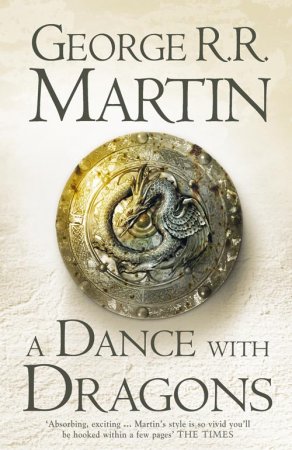 A Dance with Dragons
A Dance with Dragons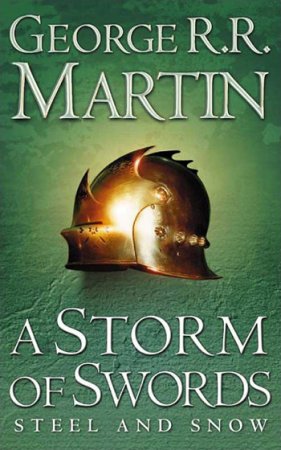 A Storm of Swords
A Storm of Swords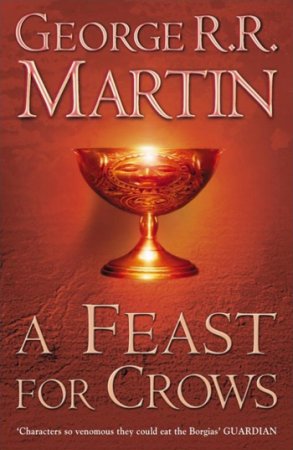 A Feast for Crows
A Feast for Crows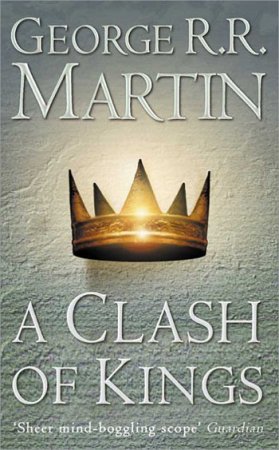 A Clash of Kings
A Clash of Kings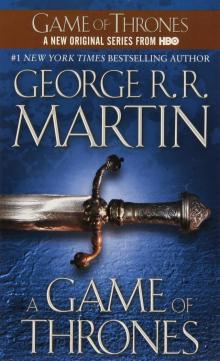 A Game of Thrones
A Game of Thrones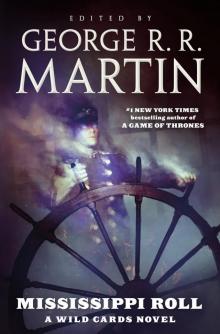 Mississippi Roll
Mississippi Roll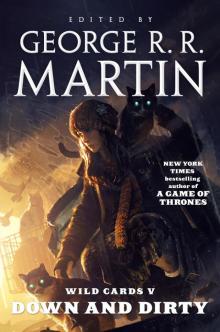 Wild Cards V: Down and Dirty
Wild Cards V: Down and Dirty Busted Flush
Busted Flush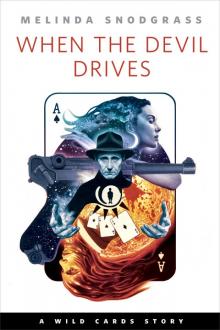 When the Devil Drives
When the Devil Drives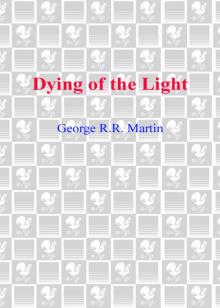 Dying of the Light
Dying of the Light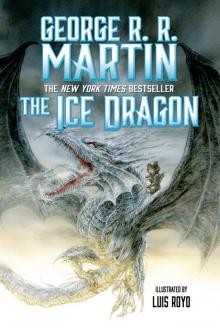 The Ice Dragon
The Ice Dragon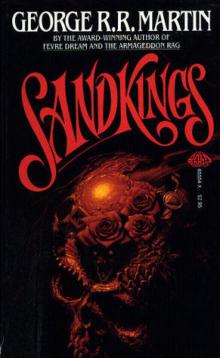 Sandkings
Sandkings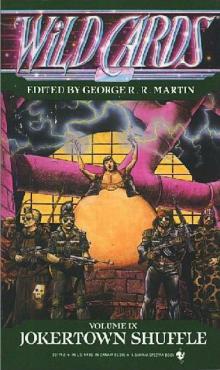 Jokertown Shuffle
Jokertown Shuffle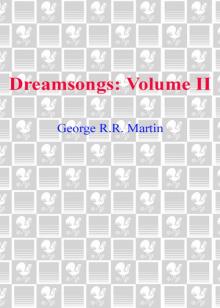 Dreamsongs. Volume II
Dreamsongs. Volume II Deuces Down
Deuces Down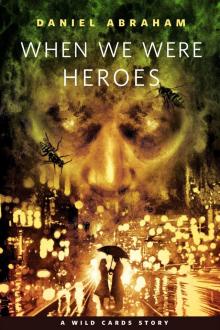 When We Were Heroes
When We Were Heroes Warriors
Warriors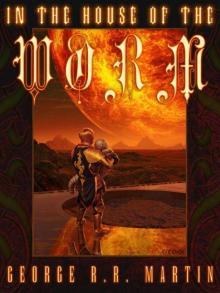 In the House of the Worm
In the House of the Worm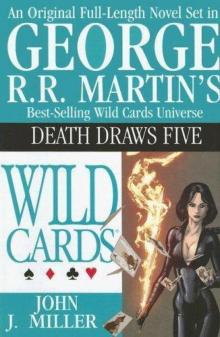 Death Draws Five
Death Draws Five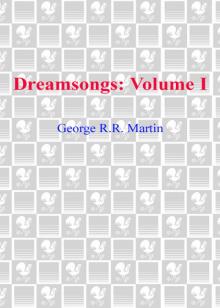 Dreamsongs. Volume I
Dreamsongs. Volume I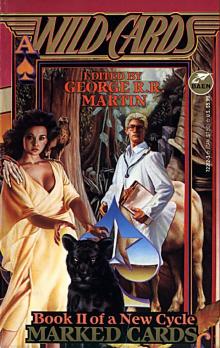 Marked Cards
Marked Cards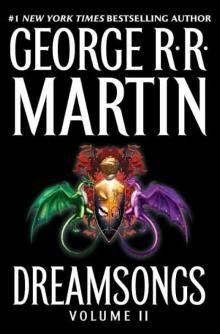 Dreamsongs
Dreamsongs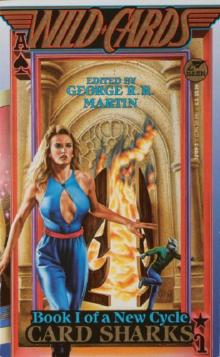 Card Sharks
Card Sharks Dangerous Women
Dangerous Women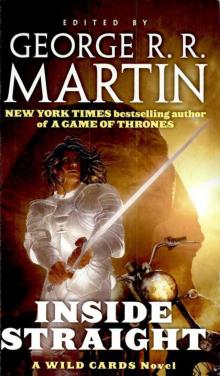 Inside Straight
Inside Straight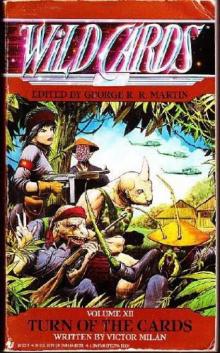 Turn of the Cards
Turn of the Cards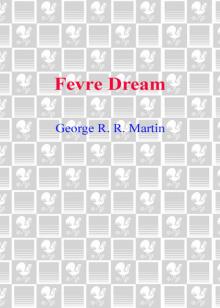 Fevre Dream
Fevre Dream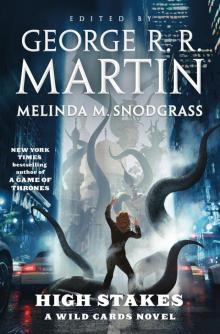 High Stakes: A Wild Cards Novel
High Stakes: A Wild Cards Novel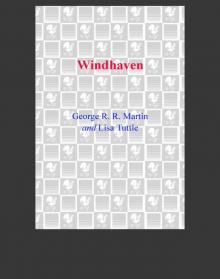 Windhaven
Windhaven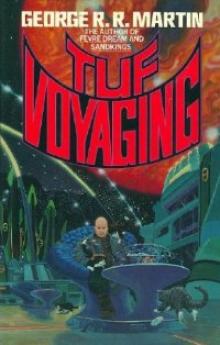 Tuf Voyaging
Tuf Voyaging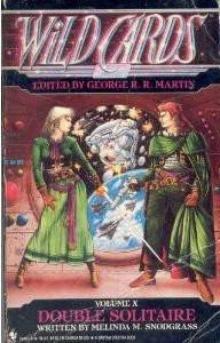 Double Solitaire
Double Solitaire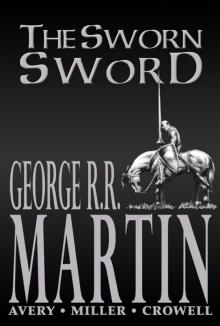 The Sworn Sword
The Sworn Sword Low Chicago
Low Chicago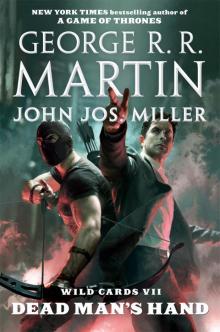 Dead Man's Hand
Dead Man's Hand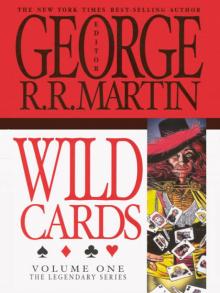 Wild Cards
Wild Cards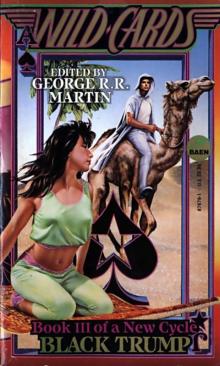 Black Trump
Black Trump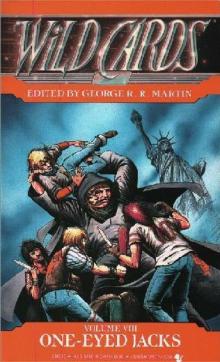 One Eyed Jacks
One Eyed Jacks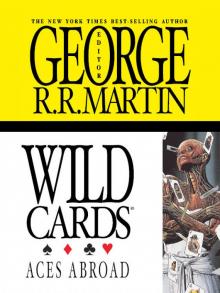 Wild Cards: Aces Abroad
Wild Cards: Aces Abroad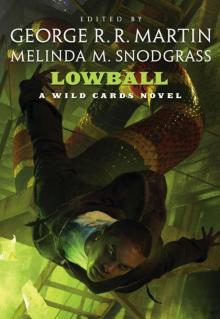 Lowball: A Wild Cards Novel
Lowball: A Wild Cards Novel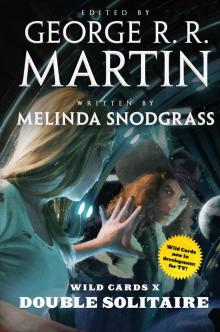 Double Solitaire (2019 Edition)
Double Solitaire (2019 Edition)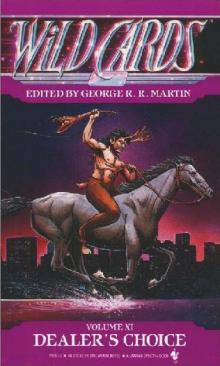 Dealer's Choice
Dealer's Choice Ace in the Hole
Ace in the Hole A Song for Lya: And Other Stories
A Song for Lya: And Other Stories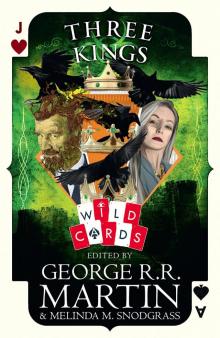 Three Kings
Three Kings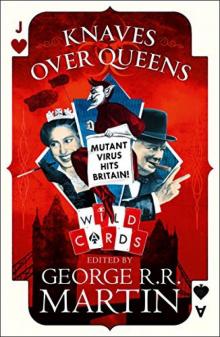 Knaves Over Queens
Knaves Over Queens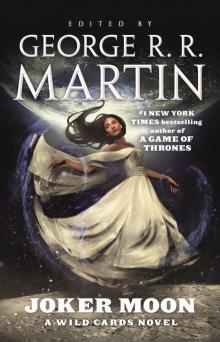 Joker Moon
Joker Moon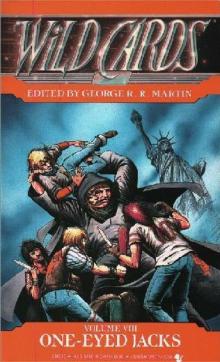 One Eyed Jacks wc-8
One Eyed Jacks wc-8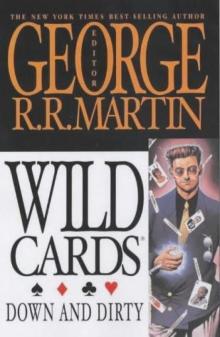 Down And Dirty wc-5
Down And Dirty wc-5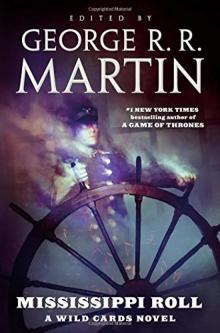 Mississippi Roll_A Wild Cards Novel
Mississippi Roll_A Wild Cards Novel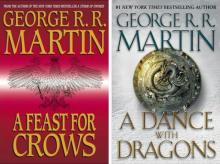 A Feast for Dragons
A Feast for Dragons The Sworn Sword ttodae-2
The Sworn Sword ttodae-2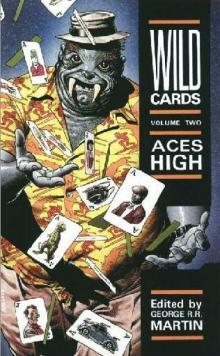 Aces High wc-2
Aces High wc-2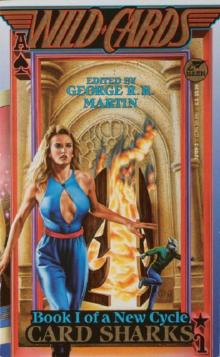 Wild Cards 13 : Card Sharks
Wild Cards 13 : Card Sharks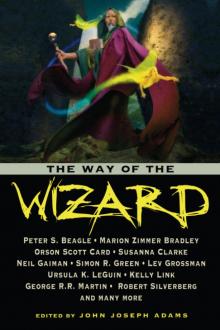 Way of the Wizard
Way of the Wizard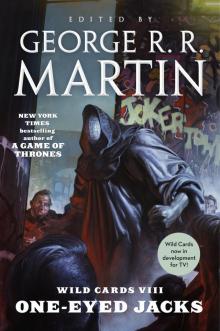 Wild Cards VIII: One-Eyed Jacks
Wild Cards VIII: One-Eyed Jacks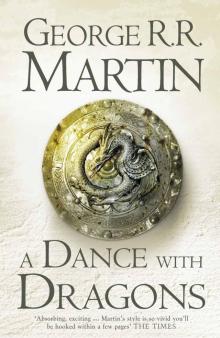 A Dance With Dragons: Book 5 of A Song of Ice and Fire (Song of Ice & Fire 5)
A Dance With Dragons: Book 5 of A Song of Ice and Fire (Song of Ice & Fire 5) The Princess and The Queen, Or, The Blacks and The Greens (a song of ice and fire)
The Princess and The Queen, Or, The Blacks and The Greens (a song of ice and fire)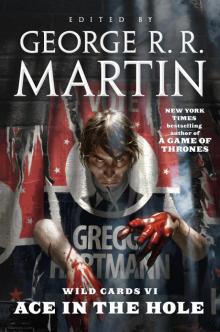 Wild Cards VI--Ace in the Hole
Wild Cards VI--Ace in the Hole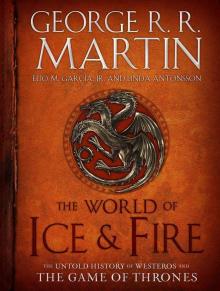 The World of Ice & Fire: The Untold History of Westeros and the Game of Thrones (A Song of Ice and Fire)
The World of Ice & Fire: The Untold History of Westeros and the Game of Thrones (A Song of Ice and Fire)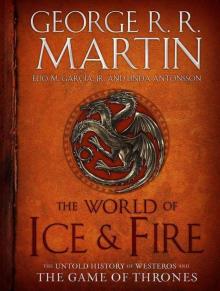 The World of Ice & Fire: The Untold History of Westeros and the Game of Thrones
The World of Ice & Fire: The Untold History of Westeros and the Game of Thrones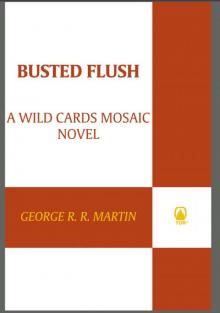 Busted Flush wc-19
Busted Flush wc-19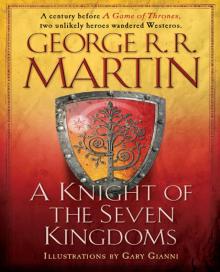 A Knight of the Seven Kingdoms
A Knight of the Seven Kingdoms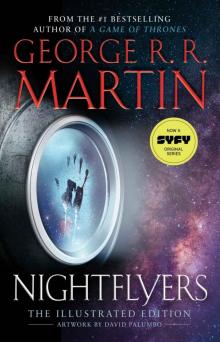 Nightflyers: The Illustrated Edition
Nightflyers: The Illustrated Edition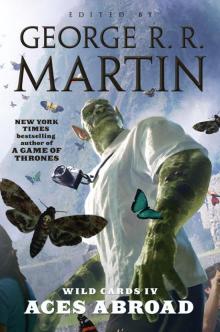 Wild Cards IV
Wild Cards IV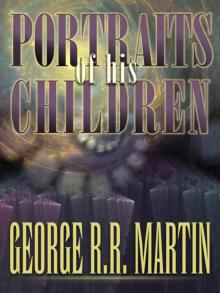 Portraits of His Children
Portraits of His Children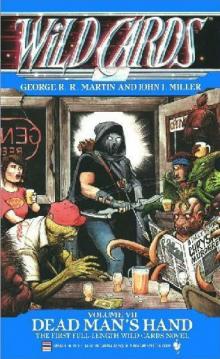 Dead Mans Hand wc-7
Dead Mans Hand wc-7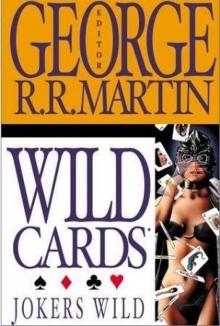 Jokers Wild wc-3
Jokers Wild wc-3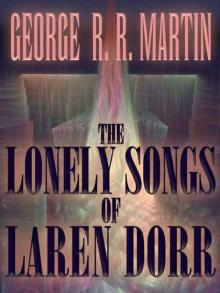 The Lonely Songs of Laren Dorr
The Lonely Songs of Laren Dorr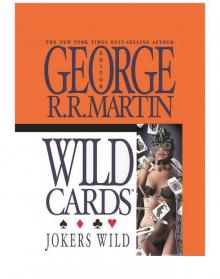 Wild Cards III: Jokers Wild
Wild Cards III: Jokers Wild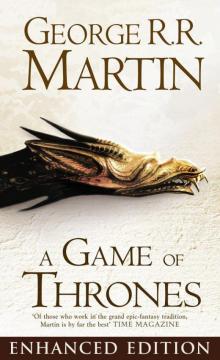 A Game of Thrones Enhanced Edition
A Game of Thrones Enhanced Edition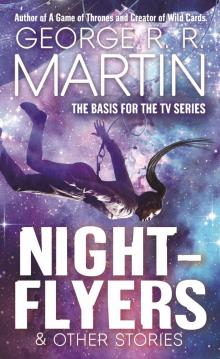 Nightflyers & Other Stories
Nightflyers & Other Stories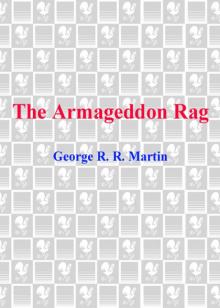 Armageddon Rag
Armageddon Rag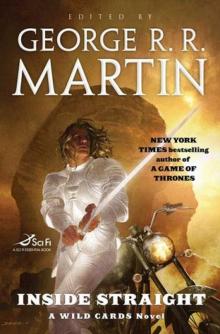 Wild Cards: Inside Straight
Wild Cards: Inside Straight A Song for Lya
A Song for Lya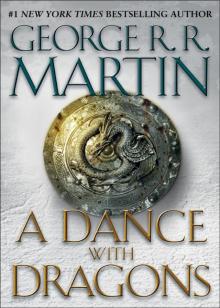 A Dance with Dragons: A Song of Ice and Fire: Book Five
A Dance with Dragons: A Song of Ice and Fire: Book Five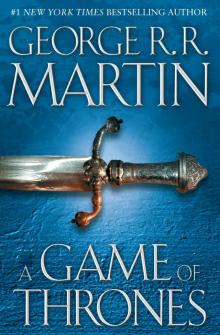 Song of Fire & Ice 01 - A Game of Thrones
Song of Fire & Ice 01 - A Game of Thrones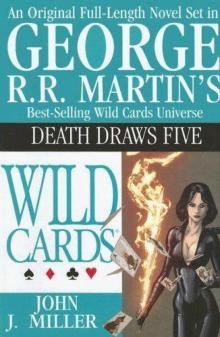 Death Draws Five wc-17
Death Draws Five wc-17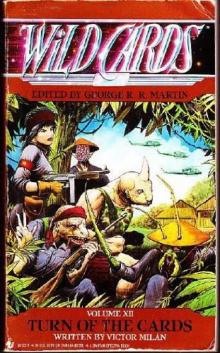 Turn of the Cards w-12
Turn of the Cards w-12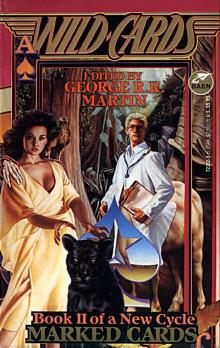 Wild Cards 14 - Marked Cards
Wild Cards 14 - Marked Cards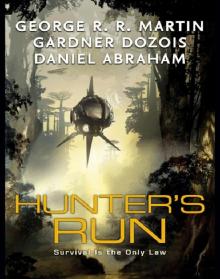 Hunter's Run
Hunter's Run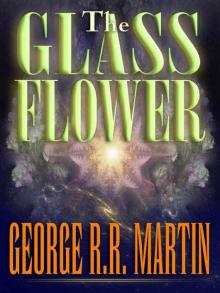 The Glass Flower
The Glass Flower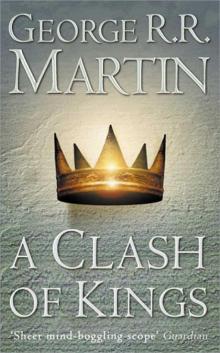 A Clash of Kings asoiaf-2
A Clash of Kings asoiaf-2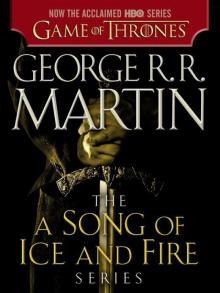 A Game of Thrones 5-Book Bundle: A Song of Ice and Fire Series: A Game of Thrones, A Clash of Kings, A Storm of Swords, A Feast for Crows, and A Dance with Dragons (Song of Ice & Fire)
A Game of Thrones 5-Book Bundle: A Song of Ice and Fire Series: A Game of Thrones, A Clash of Kings, A Storm of Swords, A Feast for Crows, and A Dance with Dragons (Song of Ice & Fire)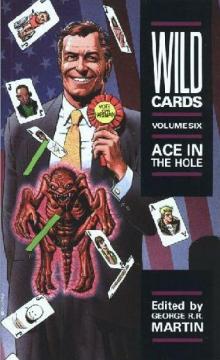 Ace In The Hole wc-6
Ace In The Hole wc-6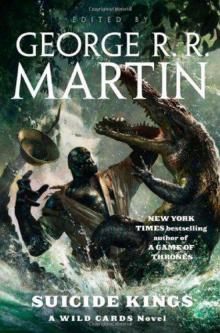 Suicide Kings wc-20
Suicide Kings wc-20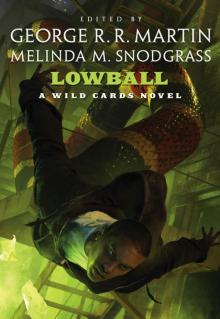 Lowball
Lowball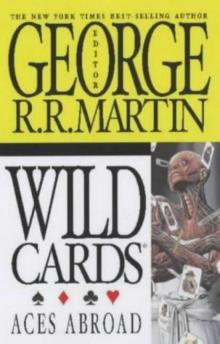 Aces Abroad wc-4
Aces Abroad wc-4 George R. R. Martin's a Game of Thrones 4-Book Bundle
George R. R. Martin's a Game of Thrones 4-Book Bundle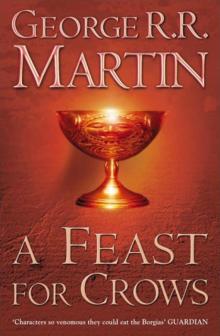 A Feast for Crows asoiaf-4
A Feast for Crows asoiaf-4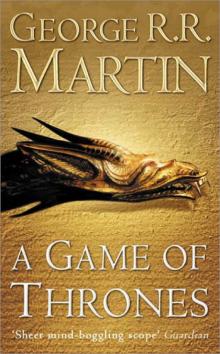 A Game of Thrones asoiaf-1
A Game of Thrones asoiaf-1 The Mystery Knight ttodae-3
The Mystery Knight ttodae-3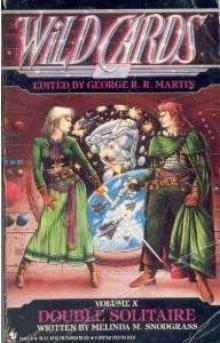 Double Solitaire w-10
Double Solitaire w-10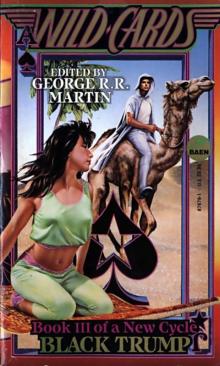 Wild Cards 15 - Black Trump
Wild Cards 15 - Black Trump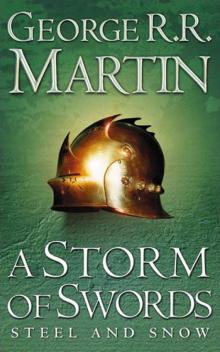 A Storm of Swords asoiaf-3
A Storm of Swords asoiaf-3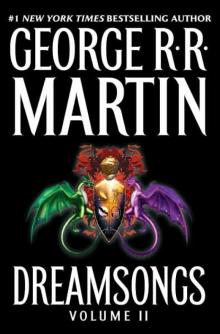 The Hedge Knight ttodae-1
The Hedge Knight ttodae-1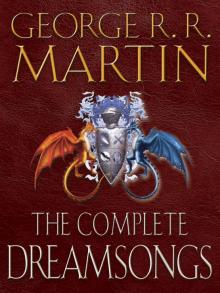 Dreamsongs 2-Book Bundle
Dreamsongs 2-Book Bundle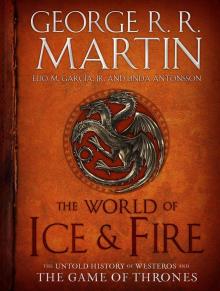 The World of Ice & Fire
The World of Ice & Fire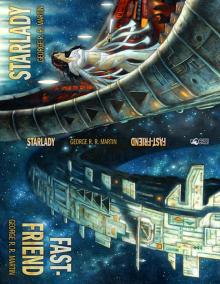 Starlady & Fast-Friend
Starlady & Fast-Friend Old Mars
Old Mars Fantasy For Good: A Charitable Anthology
Fantasy For Good: A Charitable Anthology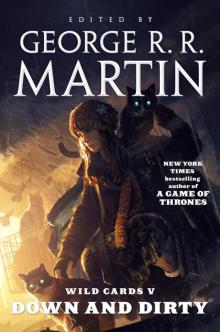 Wild Cards V
Wild Cards V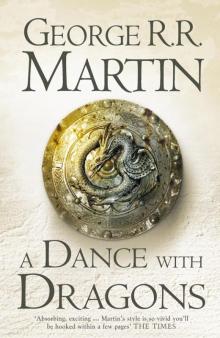 A Dance with Dragons asoiaf-5
A Dance with Dragons asoiaf-5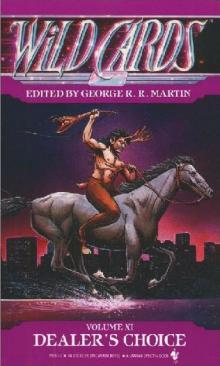 Dealer's Choice w-11
Dealer's Choice w-11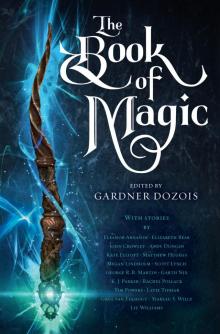 The Book of Magic
The Book of Magic A Game of Thrones 4-Book Bundle
A Game of Thrones 4-Book Bundle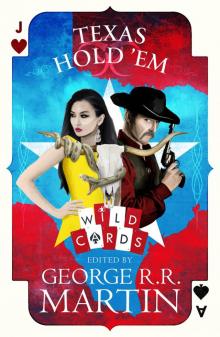 Texas Hold 'Em
Texas Hold 'Em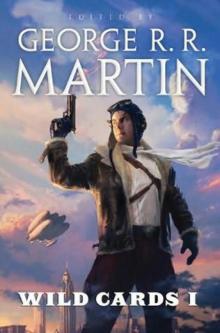 Wildcards wc-1
Wildcards wc-1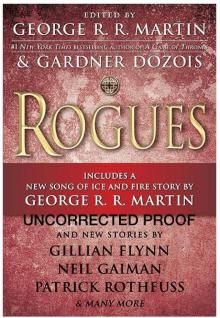 Rogues
Rogues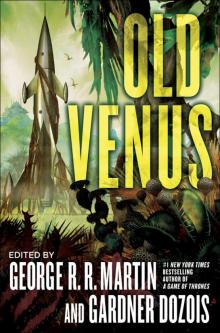 Old Venus
Old Venus